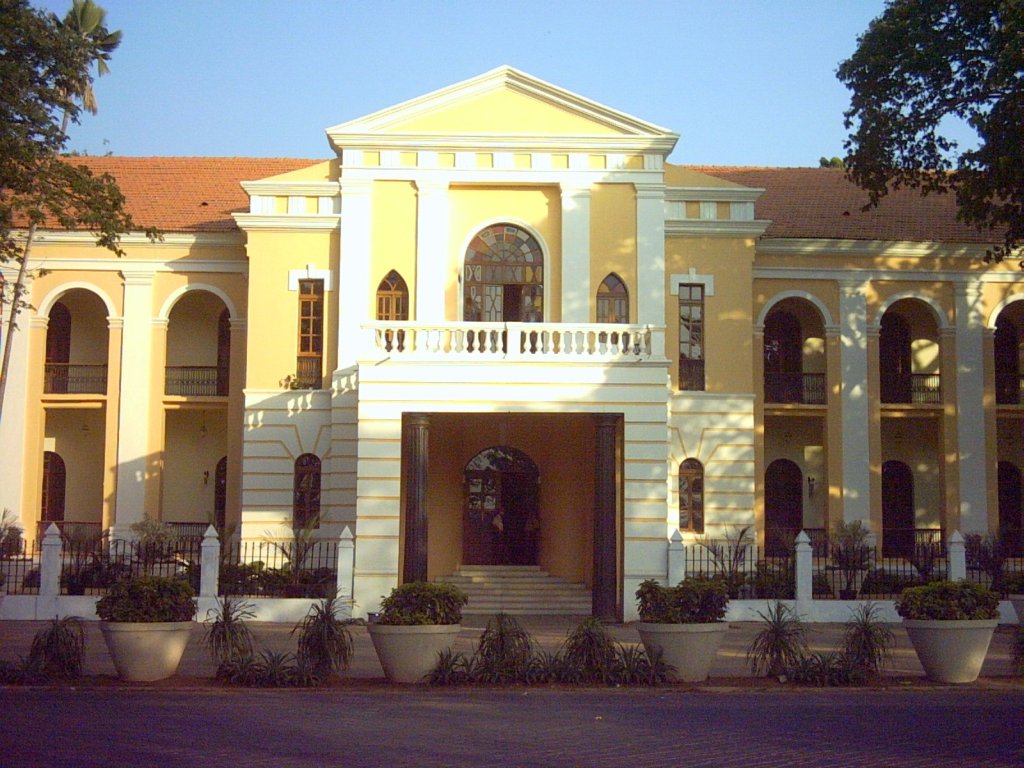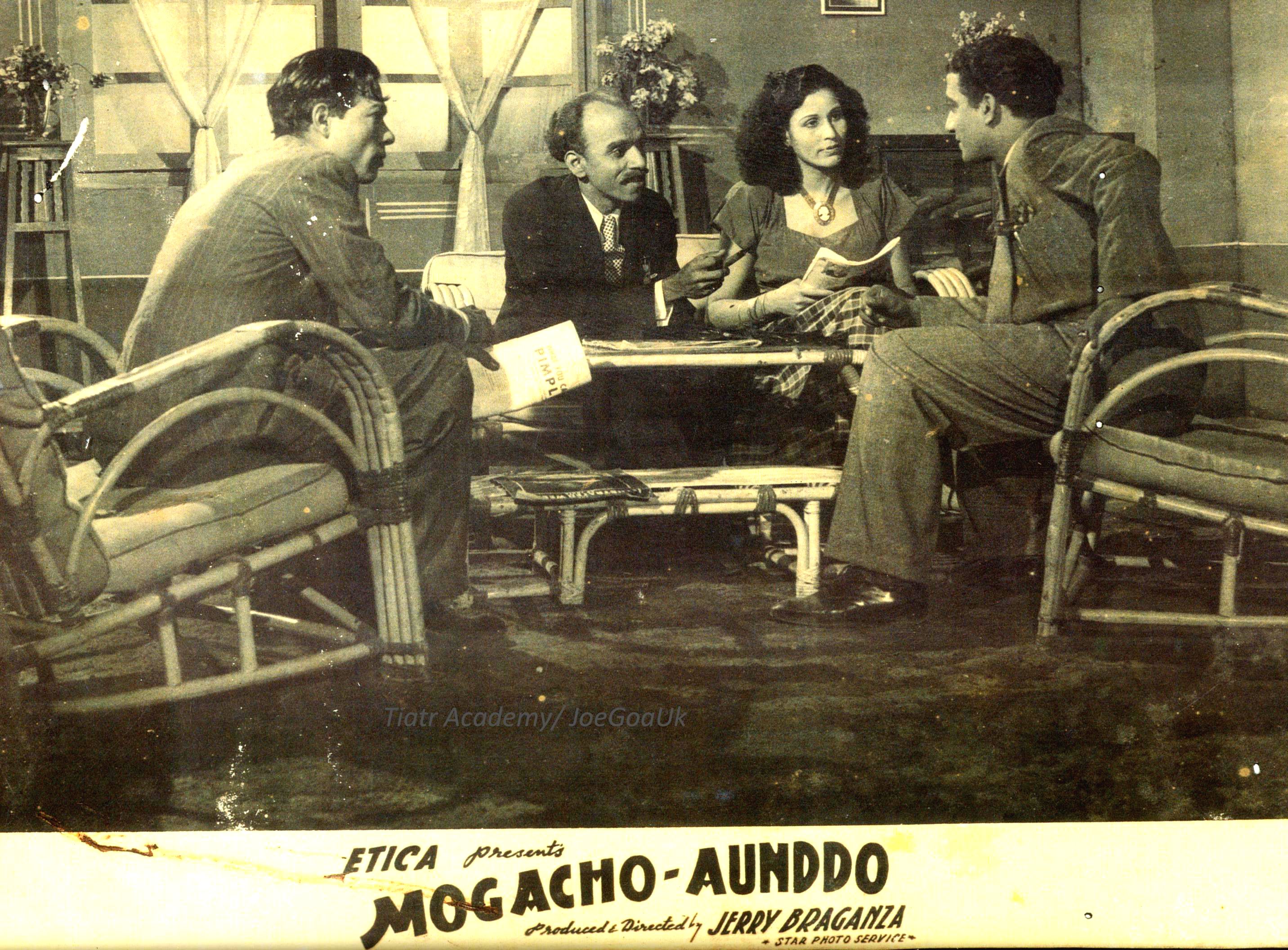|
Dioguinho D'Mello
Francis Diogo Romano de Mello (3 March 1908 – 30 September 1976), known professionally as Dioguinho D'Mello, was an Indian writer, singer, playwright, and sailor known for his work in '' tiatr'' productions. Referred to as the "Ambassador of the Konkani stage" by writer Fausto V. Da Costa, he was a multilingual singer. Using the pen name Diodem, de Mello wrote for publications such as ''The Goa Mail'' and ''The Goa Times of Bombay''. In addition to ''Mogachi Vodd'', he penned several novels including ''Tambddo Moyekar'', ''Dharunn Calliz'', ''Khotto Put'', ''Konn Zait To Crimidor?'', and ''Ugddas 1901 Vorsacho''. Early life Francis Diogo Romano de Mello was born on 3 March 1908, in Pangim, Goa, which was part of Portuguese India during the Portuguese Empire. He was a native of Candolim. His early education was conducted in the Portuguese language, while his higher education was in English. This bilingual upbringing enabled him to develop proficient skills in both languages ... [...More Info...] [...Related Items...] OR: [Wikipedia] [Google] [Baidu] |
Pangim
Panaji (; also known as Panjim) is the capital of the Indian state of Goa and the headquarters of North Goa district. Previously, it was the territorial capital of the former Portuguese India. It lies on the banks of the Mandovi river estuary in the Tiswadi sub-district ''( tehsil)''. With a population of 114,759 in the metropolitan area, Panaji is Goa's largest urban agglomeration, ahead of Margao and Mormugao. Panaji has terraced hills, concrete buildings with balconies and red-tiled roofs, churches, and a riverside promenade. There are avenues lined with gulmohar, acacia and other trees. The baroque Our Lady of the Immaculate Conception Church is located overlooking the main square known as Praça da Igreja. Panaji has been selected as one of hundred Indian cities to be developed as a smart city under the Smart Cities Mission. The city was built with stepped streets and a seven kilometre long promenade on a planned grid system after the Portuguese relocated the c ... [...More Info...] [...Related Items...] OR: [Wikipedia] [Google] [Baidu] |
Tremolo
In music, ''tremolo'' (), or ''tremolando'' (), is a trembling effect. There are two types of tremolo. The first is a rapid reiteration: * Of a single Musical note, note, particularly used on String instrument#Bowing, bowed string instruments, by rapidly moving the bow back and forth; plucked strings such as on a harp, where it is called ''wikt:bisbigliando, bisbigliando'' () or "whispering". Tremolo picking, on traditionally plucked string instruments including guitar and mandolin, is the rapid articulation of single notes or a group of notes with a plectrum (pick) or with fingers. Tremolo playing sustains notes that would otherwise rapidly decay (fade to silence). * Between two notes or chords in alternation, an imitation (not to be confused with a trill (music), trill) of the preceding that is more common on keyboard instruments. Mallet instruments such as the marimba are capable of either method. * A drum roll, roll on any percussion instrument, whether tuned or untuned. ... [...More Info...] [...Related Items...] OR: [Wikipedia] [Google] [Baidu] |
Goan
Goans ( kok, गोंयकार, Romi Konkani: , pt, Goeses) is the demonym used to describe the people native to Goa, India, who form an ethno-linguistic group resulting from the assimilation of Indo-Aryan, Dravidian, Indo-Portuguese, and Austro-Asiatic ethnic and/or linguistic ancestries. They speak different dialects of Konkani language natively, collectively known as Goan Konkani. "''Goanese"'' is an incorrect term for Goans. Language Goans are multilingual, but mainly speak the Konkani language, a Prakrit based language belonging to the Southern group of Indo-Aryan Languages. Various dialects of Konkani spoken by the Goans which include ''Bardezkari'', ''Saxtti'', ''Pednekari and'' ''Antruz''. The Konkani spoken by the Catholics is notably different from those of the Hindus, since it has a lot of Portuguese influence in its vocabulary. Konkani was suppressed for official documentation use only not for unofficial use under the Portuguese governance, playing a minor pa ... [...More Info...] [...Related Items...] OR: [Wikipedia] [Google] [Baidu] |
Konkani Language
Konkani () is an Indo-Aryan language spoken by the Konkani people, primarily in the Konkan region, along the western coast of India. It is one of the 22 scheduled languages mentioned in the Indian Constitution, and the official language of the Indian state of Goa. It is a minority language in Karnataka, Maharashtra, Kerala, Gujarat & Damaon, Diu & Silvassa. Konkani is a member of the Southern Indo-Aryan language group. It retains elements of Vedic structures and shows similarities with both Western and Eastern Indo-Aryan languages. The first Konkani inscription is dated 1187 A.D. There are many Konkani dialects spoken along and beyond the Konkan region, from Damaon in the north to Carwar in the south, most of which are only partially and mutually intelligible with one another due to a lack of linguistic contact and exchanges with the standard and principal forms of Konkani. It is also spoken by migrants outside of the Konkan proper; in Surat, Cochin, Mangalore, Ahmedabad, ... [...More Info...] [...Related Items...] OR: [Wikipedia] [Google] [Baidu] |
Panaji, Goa
Panaji (; also known as Panjim) is the capital of the Indian state of Goa and the headquarters of North Goa district. Previously, it was the territorial capital of the former Portuguese India. It lies on the banks of the Mandovi river estuary in the Tiswadi sub-district ''( tehsil)''. With a population of 114,759 in the metropolitan area, Panaji is Goa's largest urban agglomeration, ahead of Margao and Mormugao. Panaji has terraced hills, concrete buildings with balconies and red-tiled roofs, churches, and a riverside promenade. There are avenues lined with gulmohar, acacia and other trees. The baroque Our Lady of the Immaculate Conception Church is located overlooking the main square known as Praça da Igreja. Panaji has been selected as one of hundred Indian cities to be developed as a smart city under the Smart Cities Mission. The city was built with stepped streets and a seven kilometre long promenade on a planned grid system after the Portuguese relocated the ca ... [...More Info...] [...Related Items...] OR: [Wikipedia] [Google] [Baidu] |
Tiatr Academy Of Goa
The Tiatr Academy of Goa is a government body established by the Government of Goa in 2009 during the tenure of Digambar Kamat as the Chief Minister of Goa. The Academy was inaugurated on 16 January 2009 in Margao at the hands of the tiatr artist ''Master'' Jose Francisco Vaz The Academy's aim is to foster and develop Tiatr and its dances, music, songs and literature; especially the Konkani Literature in Roman script as well as through them the cultural unity of Goa as well as India. History The tiatr has a rich history of 125 years and is an important form of theatre in the Konkani language. The first tiatr was performed in 1892 in Bombay. There had been a demand from lovers of tiatr and the artists that the Government of Goa take steps to protect and promote the theatre form. During the tenure of Digambar Kamat as the Chief Minister of Goa, a committee was established under Chief Minister Kamat's chairmanship for the purpose of drafting a constitution for t ... [...More Info...] [...Related Items...] OR: [Wikipedia] [Google] [Baidu] |
Solo (music)
In music, a solo (from the Spanish language, Spanish and Italian language, Italian based-word: ''Solo'', meaning ''alone'' or ''by yourself'') is a musical composition, piece or a section (music), section of a piece played or sung featuring a single performer, who may be performing completely alone or supported by an accompanying instrument such as a piano or Organ (music), organ, a Basso continuo, continuo group (in Baroque music), or the rest of a choir, orchestra, band, or other ensemble. Performing a solo is "to solo", and the performer is known as a ''soloist''. The plural is soli or the anglicisation, anglicised form solos. In some contexts these are interchangeable, but ''soli'' tends to be restricted to classical music, and mostly either the solo performers or the solo passage (music), passages in a single piece. Furthermore, the word ''soli'' can be used to refer to a small number of simultaneous parts assigned to single players in an orchestral composition. In the Baroq ... [...More Info...] [...Related Items...] OR: [Wikipedia] [Google] [Baidu] |
Tiatr
is a type of musical theatre popular in the state of Goa on the west coast of India as well as in Mumbai and with expatriate communities in the Middle East, United Kingdom and other cities where Konkani speakers have a considerable presence. The dramas are performed mainly in the Roman Konkani dialects and include music, dancing and singing. performers are called ''tiatrists''. Etymology The word comes from the Portuguese word for theatre, . Earlier variations of the word were and . Description today revolves around social, religious and political themes. It is considered to be a mirror of Goan culture. The drama consists of six or seven acts called . The acts are interspersed by songs which need not be directly linked to the content or the issues of the main drama. There are two or three songs between each of the acts. ''Tiatrists'' have always demonstrated a very high degree of social awareness. Most of the themes of are concerned with social problems confronting the pe ... [...More Info...] [...Related Items...] OR: [Wikipedia] [Google] [Baidu] |
Mapuçá
Mapusa (म्हापशें) is a town in North Goa, India. It is situated 13 km north of the capital Panaji. The town is the headquarters of Bardez Taluka. It is located on the main highway NH-17, linking Mumbai to Kochi. In Portuguese, the town is known as Mapuçá. History Mapusa is a small town clustered around the Mount (Alto). The name Mapusa is thought to be derived from the Konkani word for a 'measure' - 'map' and the phrase fill up - 'sa'. Ancient Goan agrarian community had a well established ''Comunidades of Goa, Gaunkari'' or Community Farming System, where villages formed associations, worked on community land and shared profits. Market day was a major event, with goods brought in from every district to one central area. Mapusa has thus remained a prominent market center for many centuries. Geography Mapusa is located at . It has an average elevation of 15 metres (49 feet).It lies on the banks of Mapusa River. Mapusa has a tropical climate wit ... [...More Info...] [...Related Items...] OR: [Wikipedia] [Google] [Baidu] |
Al Jerry Braganza
Antonio Lourenço Jerry Braganza (28 August 1920 – 8 January 1990), known professionally as Al Jerry Braganza, was an Indian filmmaker, actor, and singer known for his work in Konkani cinema, Konkani films. Referred to as the "Father of Konkani cinema," Braganza directed and produced the first Konkani film, ''Mogacho Aunddo'' (1950), following the unreleased film ''Sukhi Konn'' (1949), an unsuccessful attempt by playwright G. M. B. Rodrigues. Career In 1940, Braganza pursued higher education and settled in Bombay (now Mumbai, India). He enrolled at the Bombay Tutorial College and gained practical experience as a motor mechanic at the IEME Workshop in Colaba. Subsequently, he joined the ''Indian News Parade'', which is now known as Films Division of India, The Films Division, where he worked as a Switchboard operator, telephone operator. After completing his college studies, Braganza secured employment in various cinema-related companies. He eventually became affiliated with Geet ... [...More Info...] [...Related Items...] OR: [Wikipedia] [Google] [Baidu] |



